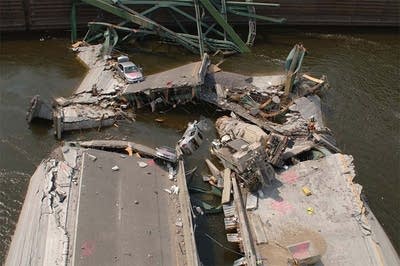Bridge victims' fund stuck at Capitol
Go Deeper.
Create an account or log in to save stories.
Like this?
Thanks for liking this story! We have added it to a list of your favorite stories.

The construction of a new 35W bridge in Minneapolis got underway just three months after the original span's tragic collapse. State lawmakers envisioned a similar rapid response to creating a compensation fund for bridge victims and their families. But after months of work on the Legislation, a final agreement remains out of reach.
"Well, it's frustrating. It's painful. It's upsetting," said Kimberly Brown of Minneapolis, a bridge survivor who's already sat through dozens of meetings at the State Capitol.
Brown said she doesn't know how long it typically takes for the wheels of the Legislature to turn. But as the conference committee process drags on, Brown said the lives of bridge survivors hang in the balance.
"It's frustrating. It's painful. It's upsetting."
"Survivors and families are in a situation today that they should never have been in, massive injuries, people having surgeries," she said. "Last week one of the survivors had another surgery. Yesterday another survivor had her eighth surgery. People's lives have been really turned upside down or destroyed by this. We're just looking for some closure."
Turn Up Your Support
MPR News helps you turn down the noise and build shared understanding. Turn up your support for this public resource and keep trusted journalism accessible to all.
Brown said she favors the compensation plan passed by the House.
Under that version, bridge victims and their families would share $40 million, with no cap on individual awards. The pool would be divided based on need. The $26 million Senate bill would cap individual payments at $400,000, which is the liability limit under current state law. Conference committee negotiations have yet to change those key differences.
Rep. Ryan Winkler, DFL-Golden Valley, said he's certain a deal will eventually get done, but he's growing frustrated by the lack of progress.
"I think to some extent the Legislature has not acted as quickly certainly as we said that we would, and as quickly as they deserve," he said. "I think it's unfortunate to have too much of a discussion about the philosophical principles of the tort cap system versus a practical solution to help the state move away from the legal claims it may face and help the victims move on with their lives."
Winkler's counterpart in the negotiations, Sen. Ron Latz, DFL-St. Louis Park, said both sides have made some concessions and fine-tuned their proposals.
Latz said the Senate addressed a House concern that some bridge victims would be left with uncompensated medical costs. He said the bill now provides easier access to a catastrophic insurance program.
But Latz isn't backing off the cap issue, because he said it would set a bad legal precedent.
"For any future event, any future individual that gets injured because of the state's action or inaction, they will be able to turn around and say, 'look what you did for the bridge victims,"' he said. "'You should do the same for me. And you should let me recover without regard to caps.' And then our caps are of no meaning whatsoever."
Latz said it's now up to House negotiators to call another conference committee meeting and make a counter offer.
Rep. Winkler said there's little interest in the House to meet again until Senate conferees indicate a greater willingness to compromise.
Gov. Tim Pawlenty favors caps on individual awards. But the Republican governor has also said he supports providing some additional compensation in the most extraordinary cases.
Dear reader,
Political debates with family or friends can get heated. But what if there was a way to handle them better?
You can learn how to have civil political conversations with our new e-book!
Download our free e-book, Talking Sense: Have Hard Political Conversations, Better, and learn how to talk without the tension.




